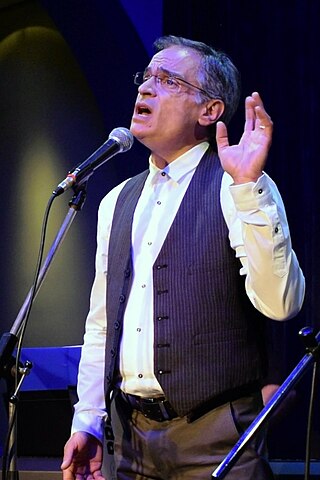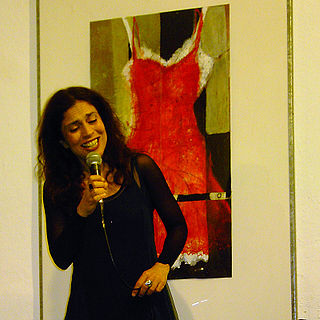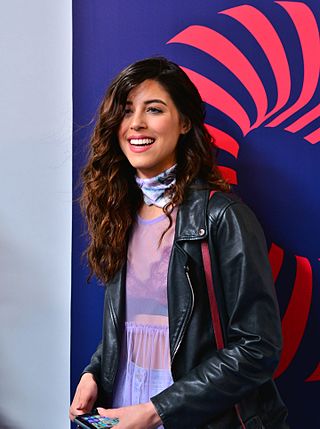Career
Her debut in recording began with the record ″Sabotage″ in 1981, which was created in cooperation with Marianina Kriezis and Savina Yannatou –with whom she had worked also in Lilipoupoli – and the singer Yiannis Palamidas. The record was considered in the Greek context as pioneering, as much for the composition and versification as also for the intensive use of the synthesizer –with which Platonos had begun to experiment for a short time before – for the first time in Greek recording. [4] There followed the circulation of 13 poems by Kostas Karyotakis set to music, a work which had been completed before Sabotage, but circulated second at the insistence of the director of Lyra, Alekos Patsiphas. Next year the album ″Manos Hatzidakis ’62″ came out, with minimal electronic arrangements of 12 songs by the composer. [5]
There followed three personal records which determined her mark on Greek electronic music and constituted a point of reference for future attempts: ″Sun Masks″ (1984), ″Gallop″ (1985), and ″Lepidoptera″ (1986). In these records Platonos turned entirely to electronic music and to experimental directions in form, orchestration and verse. Her compositions follow minimalistic motifs with intense use of keyboards, schematising carefully staged soundscapes. The voice, frequently passing through electronic filters, at times plays a central role – right up to the uniqueness in compositions of delivery – but may be used also like a simple instrument of accompaniment. Her verses, usually surrealistic in their expression, are nevertheless direct and touch on themes of daily routine and personal relationships, especially love and alienation, and are distinguished by their tenderness and at other times childlike innocence. [6]
In between the above, circulated the record ″The Sound and its Errors″ with children's songs in verses by Gianni Rodari, [7] while in 1986 Platonos worked with the other pioneers in electronic music in Greece Michalis Grigoriou and Vangelis Katsoulis in the work ″Music for keyboards″. In 1989 the children's opera ″The Emperor’s Nightingale″ came out, based on the Andersen tale of the same name, and two more records of more subdued tones and dark style followed, To Spasimo Ton Pagon (″The Breaking of the Ice″) with Yiannis Palamidas in 1989, based around the piano and non-electronic instruments, and Mi Mou tous Kiklous Tarate (″Do Not Disturb my Circles″) in 1991. In 1990 Platonos cooperated with Dionysis Savvopoulos in live appearances and on the record ″Retrospection '63-'89″ and in 1991 with Dimitra Galani on ″Myths of Europe″, arranging songs of John Lennon, Kurt Weill among others. [8]
After a period of abstention from recording and gradual distancing from publicity, Lena Platonos returned in 1997 with ″Breaths″ in cooperation with Savina Yannatou, a record with subduedly-toned love songs and orchestrations close to art music and jazz instead of electronic music. At the same time the collection ″Lena Platonos’ Blender″ came out with arrangements of her songs by well-known artists on the Greek electronic scene (Coti K, Constantinos Veta, Michalis Delta, ΙΟΝ, etc.), which enjoyed a particular flowering at that time. In 2000 the record ″The Third Doorway″ was releasec, with poems by Thodoros Poalas set to music, sung by Maria Farantouri. In March 2003 she presented her oeuvre in its entirely at a show in the Athens Concert Hall (Megaron Mousikis Athinon), the tickets for which were sold out. [9]
In December 2005 the book ″My Words″ (ed. Odos Panos) was published with verses from her songs. In February 2008 CD-single ″I Loved You″ came out in 160,000 copies together with the Sunday edition of the newspaper Eleftherotypia (Kyriakatiki Eleftherotypia), while on 18 March 2008 her new record ″Diaries″, of autobiographical character, came out with which she returned to electronic music. On 28 July 2008 at the Odeon of Herodes Atticus there was a retrospective concert for her work, where, apart from herself, Elli Paspalas, Martha Phridzilas, Constantinos Veta, and Yiannis Palamidas and Vassilikos (from Raining Pleasure) participated. [10]
In 2010 followed a double disc with the live recording of the performance at the Pallas with the participation of her well-known collaborators Savina Yannatou and Yiannis Palamidas, while in December of the same year, Lena Platonos set poems of Constantine P. Cavafy to music for the performance which was given at the Pallas, directed by Dimitris Papaioannou, on the occasion of the 150 years from the birth of the Egyptian-Greek poet. [11]
In October 2014 Lena Platonos set to music selected poems by George Chronas on the record ″Sacred Pain″, with the participation of Pantelis Theocharidis and Melina Kanas. [12]
In 2015 the album ″Gallop″ was rereleased by Dark Entries Records, drawing the attention of international press and distinguished non-greek DJs. Songs like ‘Bloody Shadows from Afar’, ‘Witches’, and ‘Ruby Liqueur’ were heard from sets of Boiler Room and Beats in Space as far as Paris catwalks as soundtracks for fashion shows of the renowned house of Dior. [13]
In 2015, Fact Magazine included ″Gallop″ in its list of the 25 best re-issues of the year in the world. [14] The same year, Lena Platonos in her concert at the Onassis STEGI presented for the first time a cycle of songs in English with the title ″Hope is the thing with feathers″. The song cycle was based on poetry by Emily Dickinson, and included the participation of Sissi Rada and Athina Routsi as singers, and Karyophyllia Karambeti as narrator, while the orchestration was by Lena Platonos and Sterios Tsirliagos. [15] In January 2016 Lena Platonos composed another song, on lyrics by Eleni Photaki, and interpreted by Tania Tsanaklidou, for the performance ‘My name is Eva’, a work based on the life of Eva Koumarianou. The performance was shown at the Alcmene Theatre, under the direction of Antonis Boskoitis. [16]
Later in 2016 the circulation of an EP from the DJ Red Axes with 4 remixes from the record ‘Galop’ is expected, while due to follow is also the recirculation of the record ‘Sun’s Masks’, once again from Dark Entries Records. [17]
In 2017 Stathis Gourgouris, Professor of Comparative Literature and Society in Columbia University, in his book chapter 'Musical Poiesis, Erotic Cosmology, and Commodity Life: The Lena Platonos Phenomenon', acclaimed Platonos′ contribution to modern greek electronic music, comparing her to Laurie Anderson. [18]
In 2021, the song cycle "Hope is the thing with feathers" was released as an album, and was followed by the compilation Balancers, an LP of previously unreleased material recorded between 1982-1985. [19]
Lena Platonos has also written music for the theatre, ballet and television, as well as works of classical music. Apart from music, she is involved in painting and miniatures and has put her works on show from time to time, while she herself has created the covers for several of her records. [20]
The music of Greece is as diverse and celebrated as its history. Greek music separates into two parts: Greek traditional music and Byzantine music. These compositions have existed for millennia: they originated in the Byzantine period and Greek antiquity; there is a continuous development which appears in the language, the rhythm, the structure and the melody. Music is a significant aspect of Hellenic culture, both within Greece and in the diaspora.
Sephardic music is an umbrella term used to refer to the music of the Sephardic Jewish community. Sephardic Jews have a diverse repertoire the origins of which center primarily around the Mediterranean basin. In the secular tradition, material is usually sung in dialects of Judeo-Spanish, though other languages including Hebrew, Turkish, Greek, and other local languages of the Sephardic diaspora are widely used. Sephardim maintain geographically unique liturgical and para-liturgical traditions.

Maria Farantouri or Farandouri is a Greek singer and also a political and cultural activist. She has collaborated with Greek composers such as Mikis Theodorakis, who wrote the score for Pablo Neruda's Canto General, which Farantouri performed worldwide.

Helena Paparizou is a Swedish-born Greek singer, songwriter and television personality. Born and raised in Sweden to Greek parents, she enrolled in various arts schools before launching a career in Sweden in 1999 as a member of the laïko and Eurodance duo Antique, who participated in the Eurovision Song Contest 2001 and afterwards became popular.
Elena Ledda is an Italian singer from Sardinia.

Christos Stasinopoulos is a Greek tenor and actor from Athens.

Savina Yannatou is a Greek singer.

I Marinella tragouda ke thimate is the name of a live album by popular Greek singer Marinella. The concert was recorded at the Athens Concert Hall on 27 April 1998. It was released on 23 June 1998 in Greece by BMG Greece and it went platinum settling at 50,000 records sold.

Ta Zeibekika is an album by popular Greek singer Stelios Kazantzidis. It was released in June, 2003 by MBI in Greece and it contains 18 greatest hits that were re-recorded by Stelios Kazantzidis in the 1990s.
Stratos Dionysiou, nicknamed "To Geraki tis Pistas", was a Greek singer, composer and lyricist.
Éntekhno is orchestral music with elements from Greek folk rhythm and melody. Its lyrical themes are often based on the work of famous Greek poets. Éntekhno arose in the late 1950s, drawing on rebetiko's westernization by Vassilis Tsitsanis and Manolis Chiotis. Mikis Theodorakis and Manos Hatzidakis were the most popular early composers of éntekhno song cycles.

The Spicy Effect, commonly referred to as Spicy or Spicy Music, is a Greek independent record label founded in 2009 by songwriter and record producer Phoebus, in association with the investment arm of Nea Tileorasi.

Dimitra Papadea, known professionally as Demy, is a Greek singer. She is signed with the Greek independent label Panik Records. She has released two studio albums, "#1" in 2012, which became platinum and "Rodino Oniro" in 2014, which became gold. In 2017, she released "Demy", a collection of all of her English songs and later she released the album "Kontra" including two new songs and older songs and collaborations that had not been included in an album up to that time. Demy has achieved 8 No.1 songs and 2 No.1 EPs at the Greek charts so far. She also combined music and acting by having taken part in 5 musicals from 2012 to 2017.

Popi Malliotaki is a Greek pop-folk singer.
Aliki Kayaloglou or Alice Kayaloglou is a Greek singer and performer and has had a long international career.

Dimitra Galani is a Greek singer and songwriter.
Litsa Diamanti is a Greek laïko singer who became famous in the 1960s and 1970s. She has been described as the "child-wonder of the Sixties decade and the absolute diva of metapolitefsi." Her hits have been described as "all-time classics."
Blue Sky is a Greek, private regional television station. It started operating in November 1990. It broadcasts digitally from Ymittos, Parnitha and Aegina, covering the region of Attica.

Korina Legaki is a Greek singer born in Herakleion, Crete, of Greek-Swedish origin. She trained in classical and jazz singing, piano and orthophony, and participated in Spyros Sakkas's Vocal Art Workshop. A multilingual and multicultural persona, she has recorded six solo records with original material as well as covers of Greek and foreign composers. She has recorded and performed with musicians, composers, singers and ensembles across several genres from free jazz to traditional and from academic to ethnic. She has sung in theaters, concert halls and various venues throughout Greece and abroad, including the Odeon of Herodes Atticus, the Athens Concert Hall, the Zappeion, the temple of Poseidon in Sounio, the Anglican Church of St. Paul's and the European Parliament. At the same time, she has undertaken significant volunteering work, joining forces on stage and in studios with refugee children.
Athanasia Gizili, better known professionally as Kaiti Grey, is a Greek singer and actress.











